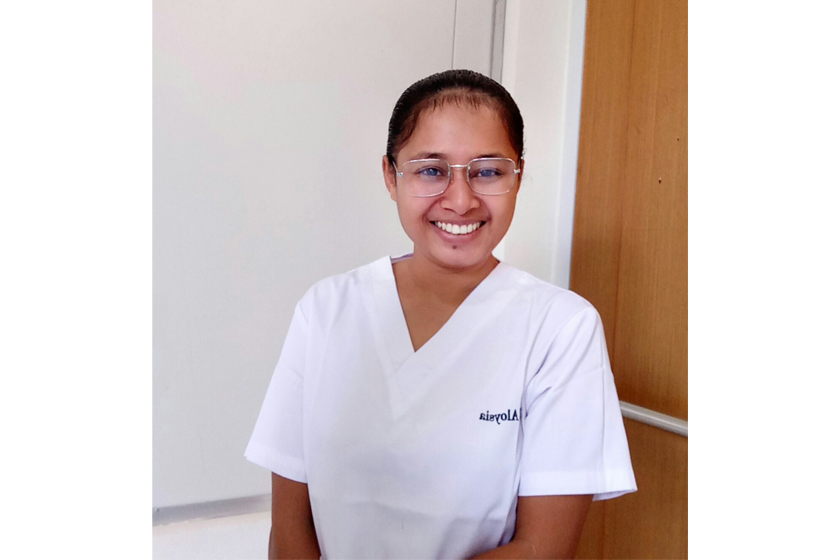
30 January 2025
Achieving Gender Equality and Good Governance: Australia Awards Alumni Drive the Change
The Australia Awards Short Course on Strengthening Gender Mainstreaming Implementation – Polic... Read more
The Australia Awards are prestigious, transformational scholarships and short courses offered to emerging leaders for study, research and professional development in Australia

07 July 2020
 Australia Awards alumna leads a data surveillance team in the fight against COVID-19 pandemic
Australia Awards alumna leads a data surveillance team in the fight against COVID-19 pandemic
Accurate and up-to-date data has rarely been more important than during the COVID-19 pandemic, when health policies must adjust quickly to changing conditions to ensure both a healthy economy and the safety of the people.
At the Komodo Regional General Hospital, Labuan Bajo, East Nusa Tenggara, COVID-19 Surveillance Coordinator and Australia Awards alumna Aloysia Juniarti Ritassi and her team are working hard to ensure data is captured accurately daily.
Aloysia and two nurses conduct daily monitoring of acute respiratory tract infection cases and pneumonia clusters, people with fever and respiratory distress with a history of travelling to infected areas or countries, and those who have contact history with those travellers.
The Surveillance Team is also responsible for collecting, processing, analysing, and disseminating data of people under monitoring due to COVID-19 symptoms, patients with symptoms, and asymptomatic confirmed COVID-19 cases being treated at the hospital, which is one of the COVID-19 referral hospitals in East Nusa Tenggara.
The team also monitors health staff who treat or are in contact with these patients and those who took the rapid test and swab. All the monitoring activities are coordinated by the Regency Surveillance of the West Manggarai Regency Health Office.
“We provide a daily report of the most up-to-date situation to the Regency Health Office, who then forwards it to the provincial level, which will help the regional government in determining which courses of action to take,” said Aloysia, who participated in the Australian Government funded Australia Awards Malaria Prevention and Treatment for Infants, Children and Pregnant Women in Eastern Indonesia short course at The Nossal Institute for Global Health in 2017.
Indonesia has recorded a total of 64,958 confirmed COVID-19 cases with an official death toll of 3,241 as of 6 July 2020, making it the country with the highest number of cases in Southeast Asia. In the province of East Nusa Tenggara in particular, confirmed cases have reached 118 since the outbreak in the country started in early March.
In addition to her role as COVID-19 Surveillance Coordinator, Aloysia also maintains her responsibilities as Surgery Polyclinic Coordinator and Malaria and Dengue Report Coordinator. She said the Australia Awards short course provided her with knowledge on how to coordinate with her superiors and various other stakeholders.
“The knowledge I gained was in the management of malaria, but I was able to apply it to the handling of the COVID-19 surveillance,” Aloysia said.
Thankfully, the surveillance team does not suffer stigmatisation despite being in direct contact with COVID-19 patients and their families. Personal protective equipment also reduces their risk of spreading infection.
While the team focuses on data and contact tracing follow-up, the surveillance efforts mean so much more than just numbers for the team. Many patients have left an impression on the team, from those who were in denial about their COVID-19 positive status, to those who accepted their diagnosis.
Aloysia and her team make an effort to listen to the patients and maintain their humanity instead of seeing them as mere numbers.
“We have learned how to communicate with families who are in denial that their loved ones have been confirmed COVID-19 positive and provide them with encouragement,” Aloysia said.
Aloysia laughed as she recalled the time she listened to a patient so intently that she did not realise her phone credit had depleted, and had to hurriedly top up the credit to continue the conversation. “We often serve as a place where the patients and their families can unburden themselves and confide their struggles,” Aloysia said.
But Aloysia also worries about how the high-risk nature of her work could affect her own family, especially as her husband also works in healthcare and is currently assigned as member of the Health Office Surveillance Team.
“The best we can do is minimise the risk of infecting our son,” Aloysia said. “We immediately take a shower when we get home before interacting with our family. We wash all our clothes and wear personal protective equipment while at work.”
Aloysia is concerned that despite the community strictly adhering to physical distancing, wearing masks, and frequently washing their hands for the past few months, many people have quickly returned to their old ways and no longer wear masks.
“In adapting to the new normal, please stay disciplined in wearing your mask and routinely wash your hands. Maintain your personal and community hygiene,” Aloysia implored. “Start with your own family.”
Photo courtesy of Aloysia Juniarti Ritass
Share this article on:
 Related Articles
Related ArticlesThis website uses cookies to improve your website experience. We may also use cookies to analyse website data so that we can improve our online services. To find out more visit our privacy policy.
